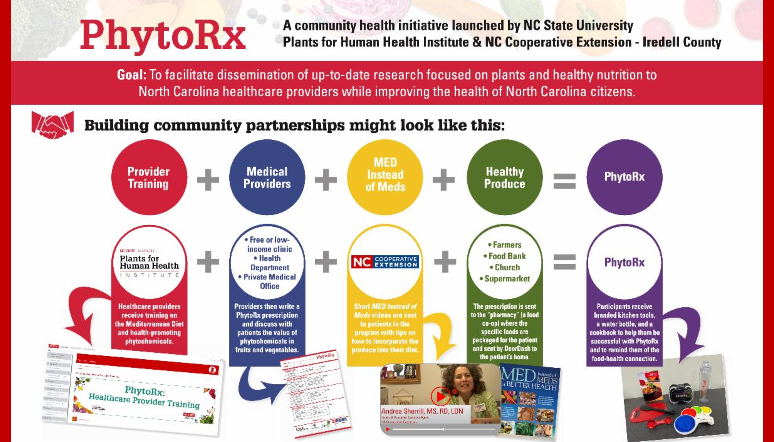What is PhytoRx and how can it work for you?

PhytoRx is a new program that helps healthcare professionals learn how to prescribe specific phytochemical-rich produce for targeted diseases.
PhytoRx fosters connections between healthcare professionals and Extension agents to tap into nutrition education for patients and food distributors to make the foods critical to health available and accessible to those in the program.
PhytoRx takes the research that is being done on food nutrients and phytochemicals and delivers it to providers so they can learn how to prescribe produce for pathology. Let me explain further. Plants not only contain vitamins and minerals, but also plant chemicals (called phytochemicals) that can have human health benefits. Phytochemicals have distinct chemical structures that work with the body’s biochemical pathways to mitigate and, sometimes, treat disease. There has been a growing interest in and awareness of anthocyanins (in berries), lycopene (in tomatoes), or carotenoids (in orange and dark green vegetables). These are phytochemicals.
Often there is confusion about the “right” diet to follow. Is it Adkins, Keto, Paleo, vegan, low-fat? PhytoRx uses the Mediterranean diet as the basis for the educational component of the program. In research studies, the Mediterranean style of eating has been shown to improve chronic diseases2,1. We have incorporated the MED Instead of Meds program, developed and delivered by NC Cooperative Extension, because of its reliable and versatile applications of the Mediterranean style of eating. Lessons on phytochemicals and their role in preventing and treating diabetes, cardiovascular disease, eye-related diseases3, skin diagnoses, and cancers are also woven into PhytoRx.
Citations
1. Çıtar Dazıroğlu, M. E., & Acar Tek, N. (2023). The Effect on Inflammation of Adherence to the Mediterranean Diet in Polycystic Ovary Syndrome. Current Nutrition Reports, 12(1), 191–202.
2. Dominguez, L. J., Veronese, N., Di Bella, G., Cusumano, C., Parisi, A., Tagliaferri, F., Ciriminna, S., & Barbagallo, M. (2023). Mediterranean diet in the management and prevention of obesity. Experimental Gerontology, 174, 112121.
3. Mulpuri, L., Sridhar, J., Goyal, H., & Tonk, R. (2023). The relationship between dietary patterns and ophthalmic disease. Current Opinion in Ophthalmology, 34(3), 189–194.
This article was part of the April 2023 e-news FRESH Rx. Subscribe for similar content delivered to your inbox monthly.
- Categories: